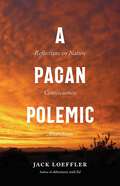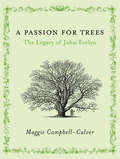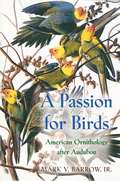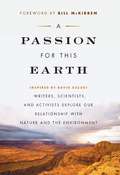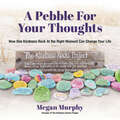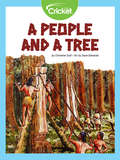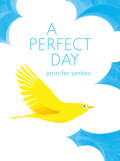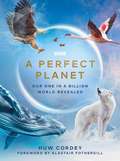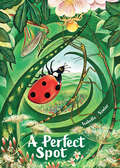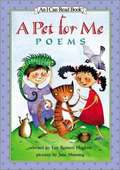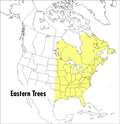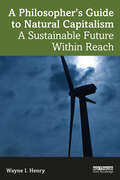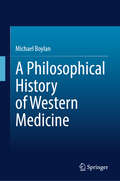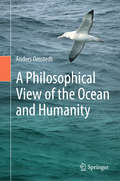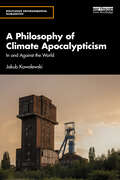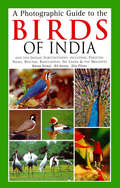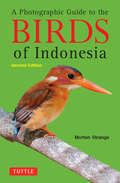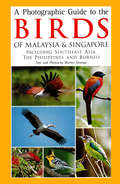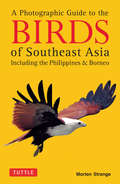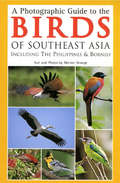- Table View
- List View
A Paddler's Guide to Everglades National Park
by Johnny MolloyWhether forging uncharted territory or slipping along marked canoe trails, get ready to experience more than 400 miles of creeks, bays, marshes, and the Gulf of Mexico. This indispensable guide for the ultimate adventure by canoe or kayak now includes GPS coordinates and twelve new paddle routes.
A Pagan Polemic: Reflections on Nature, Consciousness, and Anarchism
by Jack LoefflerA Pagan Polemic curates the evolving perspective of Jack Loeffler—itinerant wanderer, environmental warrior, storyteller, and story collector—whose true education began when he was marched into the Nevada desert one day at dawn to play &“The Stars and Stripes Forever&” during an atomic bomb test a scant few miles away. Since that day in 1957, Jack&’s mission in life has been to record peoples of the borderlands and to bring &“Indigenous mindedness&” to the forefront of the conversation about our precarious environments and our decaying planet. A Pagan Polemic is a sweeping manifesto of Jack&’s core beliefs and long experience as a fierce (and funny) advocate for Nature and Nature-mindedness and against poisonous politics and policies.
A Painting of Sand: Poems from Ghost Ranch
by L. Luis LopezThese are lyric and narrative poems inspired by a number of visits and stays at Ghost Ranch near Abiquiu, New Mexico. The beauty and the atmosphere of this high desert area during any season of the year has a special quality that inspires writers, artists, and anyone with spiritual interests (in the broad sense of that term). The book is dedicated to Ghost Ranch and the Abiquiu area, the land of Georgia O'Keefe, Thomas Merton, and countless other artists and writers.
A Passion For Trees: The Legacy Of John Evelyn
by Maggie Campbell-CulverGiven the extent of his influence on 17th-century life, and his lasting impact on the British landscape it is remarkable that no book has been written before about John Evelyn. He was a longstanding friend of Samuel Pepys (who wrote of him, ' A most excellent person he is, and must be allowed a little for conceitedness; but he may well be so, being a man so much above others.'), a founder-member of the Royal Society and a prolific writer and diarist. He was an early advocate of the garden city but his most important work was Sylva: a Discourse of Forest Trees. Sylva was presented to the Royal Society to promote the planting of timber trees 'for the supply of the Navy, the employment and advantage of the poor as well as the ornamenting of the nation.' He was responsible for the first great raft of tree-planting and for a great influx of tree introductions to Britain.Maggie Campbell-Culver's book, like Sylva, has at its core a section detailing the characteristics, history and uses of 33 trees incorporating the advice Evelyn gave and demonstrating its relevance still in the 20th-century. Not only was Evelyn probably the first horticultural writer to show an appreciation of the aesthetic benefits of trees in our landscape, he is shown to be a founder-father of the modern conservation movement.
A Passion for Birds: American Ornithology after Audubon
by Mark BarrowIn the decades following the Civil War--as industrialization, urbanization, and economic expansion increasingly reshaped the landscape--many Americans began seeking adventure and aesthetic gratification through avian pursuits. By the turn of the century, hundreds of thousands of middle-and upper-class devotees were rushing to join Audubon societies, purchase field guides, and keep records of the species they encountered in the wild. Mark Barrow vividly reconstructs this story not only through the experiences of birdwatchers, collectors, conservationists, and taxidermists, but also through those of a relatively new breed of bird enthusiast: the technically oriented ornithologist. In exploring how ornithologists struggled to forge a discipline and profession amidst an explosion of popular interest in natural history, A Passion for Birds provides the first book-length history of American ornithology from the death of John James Audubon to the Second World War. Barrow shows how efforts to form a scientific community distinct from popular birders met with only partial success. The founding of the American Ornithologists' Union in 1883 and the subsequent expansion of formal educational and employment opportunities in ornithology marked important milestones in this campaign. Yet by the middle of the twentieth century, when ornithology had finally achieved the status of a modern profession, its practitioners remained dependent on the services of birdwatchers and other amateur enthusiasts. Environmental issues also loom large in Barrow's account as he traces areas of both cooperation and conflict between ornithologists and wildlife conservationists. Recounting a colorful story based on the interactions among a wide variety of bird-lovers, this book will interest historians of science, environmental historians, ornithologists, birdwatchers, and anyone curious about the historical roots of today's birding boom.
A Passion for This Earth: Writers, Scientists, and Activists Explore Our Relationship with Nature and the Environment
by Alan Weisman Rick Bass Richard Mabey Michelle Benjamin Helen CaldicottDavid Suzuki's lifelong work as an environmentalist, naturalist, and scientist have influenced countless others in their fight to save the planet, 20 such devotees of them have contributed to this inspiring collection. <P><P>These journalists, scientists, writers and environmentalists have taken their enthusiasm for Suzuki's philosophy and funneled it into their own personal recollections, manifestos, and essays: Rick Bass describes his love for the Yaak Valley in Montana; Richard Mabey takes readers to a moonlit May evening in Suffolk; David Helvarg tells us of a stirring seaside memory from his childhood. No matter what journey these writers take us on, the unifying theme of their work is always the same: a deep and abiding love of nature - inspired and shared by David Suzuki.
A Pebble for Your Thoughts: How One Kindness Rock At the Right Moment Can Change Your Life
by Megan Murphy#1 New Release in Rocks & Minerals - Kindness Rocks as seen on the Today showFans of The Kindness Challenge and the Chicken Soup For The Soul books will love A Pebble for Your Thoughts.A rock for each kindness. It all started with a single stone on a beach in Cape Cod and now spans the globe. The Kindness Rocks Project, founded by Megan Murphy, is based on the profound truth that one kind message at the right moment can change someone’s day, their outlook, and their whole life. The project has become an international grassroots movement! The messages on these thoughtful pebbles take many forms: gratitude, affirmations, encouragement, offers of hope, all signposts along the way for someone to find at exactly the right time.Kindness matters. Now more than ever, people are longing for kindness and connection. During these uncertain times, daily news reports focus on disturbing events of terrorism, gun violence, senseless murders and political bickering. We are bombarded with images that evoke fear and hostility. A Pebble for Your Thoughts provides a positive counteraction to all this negativity.Learn to be kinder to yourself and others. Sometimes, all it takes is just one simple positive message to change your perspective and that is what this book aims to do. Through visual photos of inspirational Kindness rocks, readers can connect the meaning of the rock to their life situations or circumstances. Instructions on how to create your own rock are also included.What people will learn from this book:How to cultivate compassion and connectionHow to grow through hard timesAffirmations to boost self-esteem and offer hope in hard timesHow one act of kindness can change a lifeA completely unique kind of art therapy for healing and helpingThe power of kindness in one small pebble
A People and a Tree
by Christine GrafNative American tribes from the Northwest Coast learned to use the wood of cedar trees for many of their daily needs. Tribes used recycling to conserve resources hundreds of years ago. Pounding bark until it was fluffy to make diapers and with special thin branches called withes, cedar trees were soaked and used to make rope. What special technique did tribes use to take down big cedar trees?
A Perfect Day
by Jennifer YerkesOne bright, sunny morning, the pond&’s creatures prepare to perform a symphony. The birds begin with their calls; the frogs join in with their croaks; the fox barks, and the bees buzz. At last the clouds arrive with their thunderous percussion…Acclaimed author-illustrator Jennifer Yerkes presents the sights and sounds of an ecosystem in motion. Told with bold, vibrant art and playful onomatopoeia, A Perfect Day is a spectacular reminder to stop and listen to nature.
A Perfect Planet
by Huw CordeyThere is no place like home.The conditions of Earth are not just good for life, they are perfect. Everything about our planet - its size, its distance from the Sun, its spin and tilt, its moon - is perfectly suited to our existence, and our planet's forces serve to nurture its spectacular biodiversity. A Perfect Planet shows in stunning detail how Earth has always been more than the sum of its parts. Unlike any other astronomical body, it is a living world.Focusing on four key natural forces - global weather systems distributing fresh water to all corners; marine currents delivering nutrients to the deepest reaches of the ocean; solar energy warming and electrifying everything it touches; and volcanic activity fertilising the earth's surface - Huw Cordey reveals to us new levels of this living world, a place populated with astonishing characters living remarkable lives. From Arctic wolves prowling moonlit landscapes or wood frogs, frozen in winter and magically thawing back to life, to flamingos flying thousands of miles to a vast volcanic lake in Africa to breed, we see time and again how animals are perfectly adapted to whatever the environment throws at them.Packed with over 250 full-colour images, and including a foreword by Alastair Fothergill and stills from the BBC series' spectacular footage, A Perfect Planet is a stunning exploration of life on Earth - life that is increasingly precious and rare.
A Perfect Spot
by Isabelle SimlerA ladybug needs a safe place to lay her eggs, but where can she find an open spot? Katydids flutter in the leaves, stick insects hide in the branches, and thorn bugs pop out from every available stem. Even those bright pink flowers are orchid mantises ready to strike! Will any of these creatures be the right neighbors for the ladybug&’s eggs? Illustrated with lush, vibrant details, A Perfect Spot is a fascinating introduction to the diverse world of arthropods. Acclaimed creator Isabelle Simler presents a bug&’s eye view of camouflage, metamorphosis, and other natural wonders.
A Pet for Me: Poems (I Can Read! #Level 3)
by Lee Bennett Hopkins Jane ManningFrom a devoted mutt giving "sloppy doggy kisses" to a tarantula munching happily on a cricket lunch, this lively collection of twenty poems celebrates the relationship between children and their pets. Popular poet and noted anthologist Lee Bennett Hopkins brings together many of today's best children's poets -- including X. J. Kennedy, Alice Schertle, and Karla Kuskin -- in this delightful festival of friendship. Jane Manning's bright and richly textured art cheerfully complements these playful poems.
A Peterson Field Guide To Eastern Trees: Eastern United States And Canada, Including The Midwest (Peterson Field Guides #Volume 11)
by Janet Wehr George A. PetridesFind what you're looking for with Peterson Field Guides—their field-tested visual identification system is designed to help you differentiate thousands of unique species accurately every time. This field guide features detailed descriptions of 455 species of trees native to eastern North America, including the Midwest and the South. The 48 color plates, 11 black-and-white plates, and 26 text drawings show distinctive details needed for identification. Color photographs and 266 color range maps accompany the species descriptions.
A Philosopher's Guide to Natural Capitalism: A Sustainable Future Within Reach
by Wayne I. HenryThis book posits that a sustainable future is possible without abandoning Capitalism. In its current form as Consumer Capitalism, the organization of the global economy is clearly unsustainable. But Capitalism is a malleable concept that has assumed a variety of forms since the 17th century, and it can be altered as needed. In Part I of this book, the author sets out an economic model for a sustainable form of Capitalism, referred to in the literature as Natural Capitalism. In Part II, he abandons exposition in favour of rigorous philosophical analysis and critiques the older but still dominant narrative that underlies Classical Liberalism. The narrative will be reconstructed with great care and analysed to understand why it has been so powerful and enduring, and, of course, why it is no longer appropriate for our current circumstances. In Part III, he investigates from a normative perspective Classical Liberalism and globalized Capitalism and the economic system it licenses. Finally, in the conclusion, the author draws the threads of the discussion together in a way that emphasizes the differences between the two narratives, Classical Liberalism on the one hand and the contemporary version of Progressive Liberalism that nurtures and supports Natural Capitalism on the other. This book will be of interest to a broad range of scholars and curious laypersons interested in a clear and interdisciplinary presentation of the issues arising out of climate change, including corporate governance, social and environmental policy, declining social capital and the capacity of democratic institutions to deal effectively with sustainability. It will be particularly relevant for students and instructors of philosophy, history, economics, political science, social policy and environmental sociology.
A Philosophical History of Western Medicine
by Michael BoylanThis book provides an historical and philosophical overview of Western medicine along with commentary about how past principles affect current problems in biomedicine like genetic engineering, transhumanism, and a commitment to environmentalism. The book spans Ancient, Hippocratic and Galenic texts, Medieval writings, Modern contributions, and contemporary discoveries in the history and philosophy of medicine, including the growing role of technology in the practice of medicine. This book is of essential reading material for scholars and students interested in the history and philosophy of science as it relates to medicine, as well as those interested in the normative consequences of the study of nature for our contemporary world, particularly as it relates to medicine, environmental ethics, and genetic engineering.
A Philosophical View of the Ocean and Humanity (Springerbriefs In Environmental Science Ser.)
by Anders OmstedtThis book is about the ocean and about the future. It is written in two modes, a concerned analytical scientific mode and an intuitive artistic mode in which the ocean is given a voice. The disconnect in the relationship between human dependency on and feelings about the ocean is examined in a dialogue between these two modes. The book illustrates how science and the arts can be connected to increase our awareness of the state of the ocean and support behavioural change. This book is intended for everyone who would like to contribute to the sustainable use of the ocean. Includes forewords by Alice Newton, University of Algarve, Portugal and Martin Visbeck, GEOMAR, Helmholtz Centre for Ocean Research, Kiel, Germany.
A Philosophy of Climate Apocalypticism: In and Against the World (Routledge Environmental Humanities)
by Jakub KowalewskiThis book offers a long-overdue analysis of the ubiquity of eco-apocalypticism in current discourses on the climate crisis.Drawing on a wide range of sources and theoretical traditions from ecological works and radical pamphlets, through political theology and continental philosophy to ancient and medieval apocalypses, the book sheds a comprehensive light on the concepts, processes, and experiences which circulate around the figure of the environmental end of the world. Importantly, this book argues that apocalypticism can provide a productive philosophical framework for addressing the climate catastrophe, enabling us to propose a distinctive answer to the fundamental question which haunts progressive ecological projects: how can we defend the world we find indefensible?Appealing to students, academics, and researchers in philosophy, political theology, and environmental humanities, this book is a timely intervention which hopes to demonstrate that, when all else fails, it is the end of the world which may save the planet.
A Photographic Guide to the BIRDS OF INDIA
by Bikram Grewal Bill Harvey Otto PfisterThis guide covers 800 species found in India. Each species description is illustrated with a photograph and distribution map, making this a quick-reference guide in a pocketable format. Introductory sections include general information, such as the biogeography of the region covered.
A Photographic Guide to the Birds of India
by Bikram GrewalPeriplus is proud to present the first comprehensive photographic guide to the birds of the Indian subcontinent. This ebook offers over 800 species and distinct sub-species and contains over 1,000 full-color photographs. Each species has a distribution map. Many of the photographs in this magnificent volume appear for the first time and have been carefully selected to show the most important features of the species illustrated. In several cases, different plumages or flight shots are included. The concise text provided vital information on the plumages, voice and habits of each species covered and includes new information. Over a hundred related species are also mentioned in the texts. The maps are accompanied by a note on the status and distribution. This ebook will enable accurate field identification in one of the world's most diverse avifaunal regions. Indispensable reading for all bird lovers.
A Photographic Guide to the Birds of India
by Bikram GrewalPeriplus is proud to present the first comprehensive photographic guide to the birds of the Indian subcontinent. This ebook offers over 800 species and distinct sub-species and contains over 1,000 full-color photographs. Each species has a distribution map. Many of the photographs in this magnificent volume appear for the first time and have been carefully selected to show the most important features of the species illustrated. In several cases, different plumages or flight shots are included. The concise text provided vital information on the plumages, voice and habits of each species covered and includes new information. Over a hundred related species are also mentioned in the texts. The maps are accompanied by a note on the status and distribution. This ebook will enable accurate field identification in one of the world's most diverse avifaunal regions. Indispensable reading for all bird lovers.
A Photographic Guide to the Birds of Indonesia
by Morten Strange[A Photographic Guide to the Birds of Indonesia is a newly revised edition of the first-and best-comprehensive photographic guide to the birds of Indonesia.] Because of its vast size and geographical location, Indonesia has the world's most diverse avifauna. It boasts of more than 1,600 species-of which 235 species are only found in Indonesia, making it the world's number one travel destination for bird-watching.[This book covers a total of 912 species, including most of the non-migratory and endemic species that are seen only in Indonesia. A photograph and distribution map is given for each bird.] Many new photographs appear in this volume for the first time and have been carefully selected to show the important characteristics of each bird. [The concise text provide vital information, and an index of common names is provided at the back of the book.]
A Photographic Guide to the Birds of Indonesia
by Morten Strange[A Photographic Guide to the Birds of Indonesia is a newly revised edition of the first-and best-comprehensive photographic guide to the birds of Indonesia.] Because of its vast size and geographical location, Indonesia has the world's most diverse avifauna. It boasts of more than 1,600 species-of which 235 species are only found in Indonesia, making it the world's number one travel destination for bird-watching.[This book covers a total of 912 species, including most of the non-migratory and endemic species that are seen only in Indonesia. A photograph and distribution map is given for each bird.] Many new photographs appear in this volume for the first time and have been carefully selected to show the important characteristics of each bird. [The concise text provide vital information, and an index of common names is provided at the back of the book.]
A Photographic Guide to the Birds of Malaysia & Singapore: Including Southeast Asia, the Philippines and Borneo
by Morten StrangePeriplus is proud to present the very first comprehensive photographic guide to the birds of Malaysia and Singapore, mainland Southeast Asia, the Philippines and Borneo.<P><P> Included are the birds of Thailand and Indochina, as well as those found in South China, Hong Kong and Taiwan.This book covers 668 species and contains more than 700 color photographs. There is a distribution map for each species.Many of the photographs in this magnificent volume appear for the first time and have been carefully selected to show the most important species. The concise text provides vital information that will ensure accurate identification of species in one of the world's most diverse avifauna regions. Indispensable reading for all bird lovers.
A Photographic Guide to the Birds of Southeast Asia
by Morten StrangeA Photographic Guide to the Birds of Southeast Asia is the first comprehensive photographic guide to the birds of mainland Southeast Asia, the Philippines and Borneo. It covers important bird species found in Malaysia, Singapore, Thailand, Cambodia and Vietnam, as well as southern China, Hong Kong, Taiwan and the Philippines.Of an estimated 10,000 living bird species in the world, Southeast Asia is home to over 3,000 of them-making this one of the most diverse avifaunal regions on the planet and a bird-watcher's paradise. This comprehensive guide covers over 660 species and has more than 700 color photographs. It is an invaluable guide to anyone planning a visit to Asia who is interested in birds. It gives a distribution map for each species and a checklist at the back.Many of the photographs in this book appear for the first time and have been carefully selected to illustrate the most important species and their key features. The text provides vital information to ensure accurate identifications. A Photographic Guide to the Birds of Southeast Asia is indispensable reading for bird lovers everywhere.
A Photographic Guide to the Birds of Southeast Asia
by Morten StrangePeriplus is proud to present the very first comprehensive photographic guide to the birds of mainland Southeast Asia, the Philippines and Borneo. Included are the birds of Peninsular Malaysia, Thailand and Indochina, as well as those found in South China, Hong Kong and Taiwan.This book covers 668 species and contains more than 700 color photographs. There is a distribution map for each species.Many of the photographs in this magnificent volume appear for the first time and have been carefully selected to show the most important species. The concise text provides vital information that will ensure accurate identification of species in one of the most diverse avifauna regions. Indispensable reading for all bird lovers.

